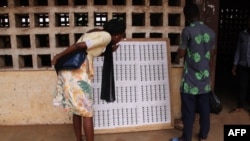Togo President Faure Gnassingbe's party won most seats in parliamentary elections, according to provisional results on Monday, in polls overshadowed by pre-ballot clashes and an opposition boycott.
But the party will need support from other legislators to secure a fourth-fifths majority for constitutional change giving Gnassingbe the chance of staying in power beyond 2020.
His Union for the Republic (UNIR) won 59 of the 91 National Assembly seats in the December 20 legislative polls, the provisional results said.
The closely-watched election in the small West African state saw the 14-party opposition coalition, C-14, refuse to take part, condemning the playing field as skewed.
"The coalition and the people have rejected any notion of elections in the prevailing conditions," Nathaniel Olympio, head of the Party of the Togolese, told AFP.
"The results don't correspond to the wishes of the Togolese who didn't take part," he added. "The struggle continues and will get even tougher after these elections."
The provisional figures will now head to the Constitutional Court, which will have a week to proclaim definitive results after discussing any challenges.
The vote went ahead last Thursday after a year of political upheaval which saw demonstrators demanding Gnassingbe step down during dozens of marches, sometimes with a large turnout.
Backdrop of bloodshed
Gnassingbe has been in power since 2005 after succeeding his father, General Gnassingbe Eyadema, who ruled the country with an iron fist for 38 years.
Earlier this month, at least four people were killed when opposition supporters and security forces clashed in the capital Lome and several other cities. The opposition put the figure at six dead.
UNIR previously held 62 seats and had hoped to secure 73, the threshold for passing laws unchallenged, including changes to the constitution paving the way for Gnassingbe to run for office in 2020 and 2025.
The ruling party's 59 seats were thus below its target but it will be supported by its main ally, the Union of Change Forces (UFC) of former opposition leader Gilchrist Olympio, who has six MPs. Other independent MPs can also lend support.
A total of 850 candidates for 12 political parties, plus independents, took part in the election.
The official turnout was about 60 percent of registered voters.
Before the vote, opposition parties had called for an overhaul of the electoral commission, more transparency and constitutional reforms to limit the number of presidential terms.
Observers from the African Union (AU) and the Economic Community of West African States (ECOWAS) said the election had been held properly.
From the Nigerian capital Abuja, regional leaders on Saturday commended the "free and transparent" nature of the vote, which corresponded with their roadmap to end crisis in Togo.
But they added they "strongly regretted" the opposition's boycott, which took place "in spite of the considerable efforts made by facilitators to promote inclusive elections."
ECOWAS, through mediators Ghana and Guinea, had pushed for elections to be held by the year's end.
But the recommendation was dismissed by the opposition as rushed, failing in particular to address flaws in the electoral commission.
"ECOWAS made a mistake of not appreciating the socio-political situation in Togo and prescribed elections instead of reforms," said Raphael Kpande-Adzare, spokesman for the FCTD, an umbrella organization of civil society groups.
